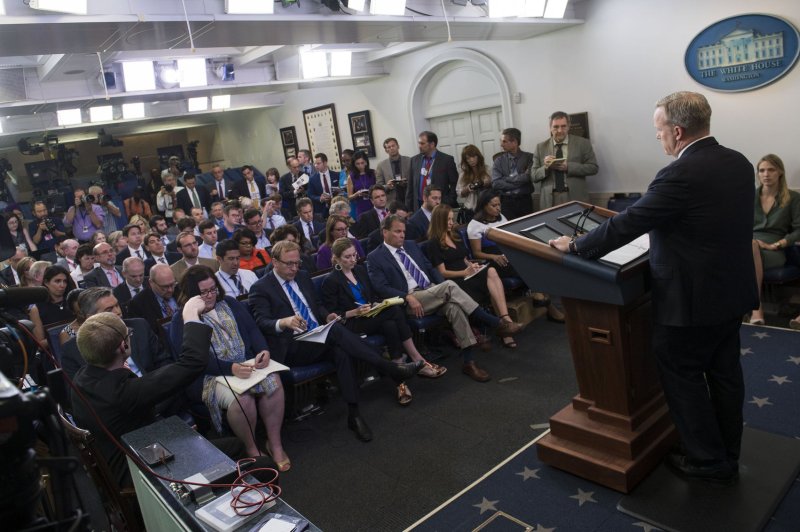White House Press Secretary Sean Spicer tells reports that, when it comes to energy dominance, exporting liquefied natural gas is a "big issue." Photo by Kevin Dietsch/UPI |
License Photo
June 27 (UPI) -- The Trump administration sees the ability to export liquefied natural gas as a way to enhance U.S. influence on the global stage, a spokesman said.
Asked during a regular press briefing about the meaning of U.S. energy dominance, White House spokesman Sean Spicer singled out the ability to export liquefied natural gas.
"Take LNG, for example," he said. "I think our ability to now export it is a big issue."
Cheniere Energy Inc., which operates the only facility in the country with the permits necessary to export LNG from domestic basins, commenced a sales agreement this week with Korea Gas Corp. Korea has a free-trade agreement with the United States, though a special LNG export permit is needed for countries that don't.
U.S. President Donald Trump is seen as a protectionist on trade. He backed out of the 12-nation Trans-Pacific Partnership trade agreement during his first week in office, though the Commerce Department in May included LNG shipments to China as part of a 100-day action plan.
The Trump administration has been critical of its European counterparts, Germany in particular, on trade. Poland, however, received a batch of LNG from this United States in early June, even though there are no U.S. free-trade deals in place in the region.
Former U.S. Vice President Joe Biden lauded natural gas as a strategic asset during a tour of Eastern Europe last year. Several U.S. allies in the region rely heavily on Russia for natural gas.
Without mentioning the United States in particular, Cecilia Malmstrom, the trade commissioner for the European Union, said trade barriers were problematic for the regional economy.
"We clearly see that the scourge of protectionism is on the rise," she said in a statement.
Spicer hinted that more action would come from the Trump administration on energy issues later this week.
"He'll have some action that he's going to be taking on behalf of the administration to move forward our dominance, our independence, our ability to maximize our natural resources and create jobs," the spokesman said.
Trump has put oil in particular at the forefront of his economic agenda, signing off early in his administration on the Dakota Access and Keystone XL oil pipelines. Spicer made no reference to oil exports, for which a 40-year old ban was lifted by former President Barack Obama.
West Texas Intermediate, the U.S. benchmark for the price of oil, is trading at a discount relative to Dubai, a Middle East benchmark, which means U.S. oil is competitive in some markets.
The four-week moving average for net U.S. crude oil exports for the week ending June 16 was 775,000 barrels per day, up 58.4 percent from the previous year.















